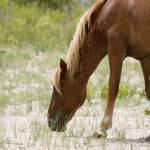Psyllium and Sand Colic in Horses: Research Update

We know that some, but not all, horses grazing in certain geographical areas with sandy soils are at risk for sand colic. Despite research efforts in this field, several questions remain unanswered, one of which is: Can horse owners really prevent or treat sand colic with psyllium?
The bulk of the research in this field supports the use of psyllium for both preventing and treating sand colic. One recent study1 found that nasogastric administration of a combination of magnesium sulfate and psyllium was more effective than either ingredient alone for treating naturally occurring sand colic. Another study supports psyllium in combination with prebiotics and probiotics for sand colic2.
That said, there are some published studies3 that do not support the use of psyllium for clearing sand.
“Overall, it appears that psyllium is beneficial for not only treating sand colic when a horse shows signs of colic but also for preventing the development of sand colic. However, more research is needed in horses naturally exposed to sand to determine the amount of psyllium that best prevents sand accumulation and the frequently of administered,” suggests Kathleen Crandell, Ph.D., Kentucky Equine Research senior nutritionist.
“Occasional feeding of psyllium, such as for one week every month, is more frequently recommended by veterinarians than daily feeding. The belief is that intermittent psyllium does not allow the equine gastrointestinal tract to become accustomed to psyllium, thus reducing its effectiveness in clearing sand. Daily psyllium intake may also prevent proper absorption of some nutrients from the intestinal mucosa,” says Bryan M. Waldridge, D.V.M., veterinarian for Kentucky Equine Research.
Until the “colon cleanse” recipe for preventing sand colic is perfected, owners are encouraged to not rely solely on any psyllium product alone. Use hay nets or racks to elevate hay off sandy ground, or place hay on rubber mats or other non-sandy surfaces.
1Niinistö, K., M. Hewetson, R. Kaikkonen. 2014. Comparison of the effect of enteral psyllium, magnesium sulphate and their combination for removal of sand from the large colon of horses. Veterinary Journal 202:608–611.
2Landes, A.D., D.M. Hassel, J.D. Funk, et al. 2008. Fecal sand clearance is enhanced with a product combining probiotics, prebiotics, and psyllium in clinically normal horses. Journal of Equine Veterinary Science 28(2):79–84.
3Hammock, P.D., D.E. Freeman, G.J. Baker. 1998. Failure of psyllium mucilloid to hasten evaluation of sand from the equine large intestine. Veterinary Surgery27(6):547–554.








